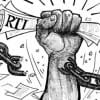Right to information: Time for the sunshine law

The seismic changes in Bangladesh in three fateful weeks—from mid-July to early August—were a powerful testament to people's power. The induction of an interim government led by Nobel laureate Prof Muhammad Yunus has been a harbinger of hope for the country's Right to Information (RTI) Act. This law can help meet the nation's cry for systemic change in governance.
Over the years, this column has lamented that a powerful law like the RTI Act has not been utilised to its full extent. More than a handful of activists and individual citizens have used it, but Bangladesh's civil society, known for its stand on public issues, has largely stayed away. One reason for this was the fear of possible reprisal by the authorities facing information requests on sensitive matters that may expose their misdeeds.
Under the country's changed circumstances, it is time for all, particularly our student community which led the recent uprising, to turn their attention to the law.
An important attribute of the RTI Act is fostering interaction between citizens and public officials. By seeking pertinent information from public offices, citizens establish contact with the officials and simultaneously remind them that they are under public scrutiny. Such interaction was impossible under the Official Secrects Act, 1923, a remnant of colonial times, which prevailed before the enactment of the RTI Act.
RTI is popularly called the sunshine law, as it is meant to shine light on a government's activities. The RTI Act, 2009 provides a legal framework for all citizens to access relevant information from government offices relating to their responsibilities. The idea is that by doing so, they can assess if the offices concerned are performing their duties under the laws of the land. The preamble to the act proclaims that by applying the law, "transparency and accountability of all public ... institutions ... shall increase, corruption of the same shall decrease and good governance of the same shall be established."
Unlike most other laws, the RTI Act requires all public offices to promptly respond to citizens' information requests and, where delinquent, face sanctions. This is a powerful way to hold public officials accountable and make them responsive to the people. It's a step towards establishing transparent and accountable governance, the two most essential elements of democracy. While this law establishes a right, it also lays the responsibility on citizens to hold their government accountable.
Prof Yunus's call to the nation to unite and help establish peace, justice, freedom, non-discrimination and equality in the country—all very important elements for democracy—resonates well with the primary objectives of the RTI Act. By resorting to it faithfully, our youth can promote systemic changes in the country's governance culture. Their demonstrated skills in organising and achieving their goals in recent times will be invaluable in this new endeavour.
To begin with, they must fully grasp the potential of the RTI Act and learn how to use it to advance their goals. Once that is done, they must develop a specific strategy to achieve them. Therefore, understanding the law's substance and the processes involved in its application is important. Towards that end, we focus below on a few of its salient elements.
An important attribute of the RTI Act is fostering interaction between citizens and public officials. By seeking pertinent information from public offices, citizens establish contact with the officials and simultaneously remind them that they are under public scrutiny. Such interaction was impossible under the Official Secrets Act, 1923, a remnant of colonial times, which prevailed before the enactment of the RTI Act.
The RTI Act serves as a bridge, connecting citizens with government bodies meant to serve them. Any information request from a citizen to a government unit's designated officer (DO) requires a prompt response. Preparing the response, which involves consultation within the office unit, establishes a direct connection between the citizen seeking information and the relevant government office.
To illustrate the process, let us use the quota system for government jobs, which ignited the recent student protests, as an example. Suppose a citizen, whether curious or aggrieved, wished to know how the application of the quota system affected the selection of candidates for public jobs and sent an information request to the DO of the Public Service Commission (PSC). The request asked for lists of candidates who sat for the Bangladesh Civil Service (BCS) exams in a given year, were selected for government jobs, and benefited from the quota system.
The DO could provide the information faithfully if they wished to abide by the law. Another option would be to disregard or bin the request if there was something to hide or if the office felt uneasy about responding. The law, however, provides for an appeal, and if that does not lead to a satisfactory response, a complaint could be filed with the Information Commission. So, the DO and their colleagues must consider what option to take. If they took the first option, the information could be publicised and become a subject for discussion, leading to whatever action is considered necessary by those affected. This is the main objective of the law: drawing public attention to official actions affecting the public.
If the information was not provided or only partially provided and the applicant was dissatisfied, an appeal could be filed with a higher authority in the office. If that, too, was found unsatisfactory, then a complaint could be filed with the Information Commission. The latter would then have to call the two sides and decide on the respective claims, including a directive to provide the information and even sanctions against the delinquent officials. Or the commission could decide against disclosure of the information, in which case the applicant could file a writ petition with the High Court. Thus, a citizen's request for information would have led to national attention to an issue of public interest, alerting the office concerned to be at least careful about how it went about its work. Just imagine if this happened on many other national issues.
When six coordinators of the quota reform movement were picked up, social media pressure forced the authorities to reveal their whereabouts. There was widespread concern in the country about their well-being. RTI could have been used to seek such information from the police, as the law provides for a response within 24 hours if it concerns citizens' human rights. But very few knew this.
Now is the opportunity for our youth, with their courage and sense of national responsibility, to lead us in using existing laws to build a better country. We have faith in the younger citizens' capability to apply the law and oversee the system as a whole, including the role of the Information Commission and the selection process of the commissioners entrusted to safeguard such an important institution. We can only go forward from here.
Dr Shamsul Bari and Ruhi Naz are chairman and assistant director (RTI), respectively, of Research Initiatives, Bangladesh (RIB). They can be reached at [email protected].
Views expressed in this article are the author's own.
Follow The Daily Star Opinion on Facebook for the latest opinions, commentaries and analyses by experts and professionals. To contribute your article or letter to The Daily Star Opinion, see our guidelines for submission.

 For all latest news, follow The Daily Star's Google News channel.
For all latest news, follow The Daily Star's Google News channel. 










Comments